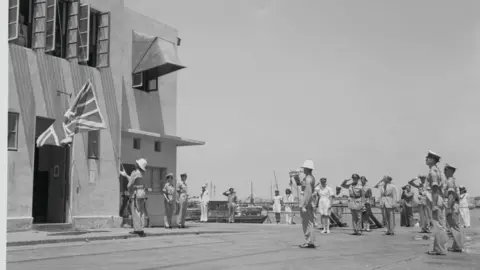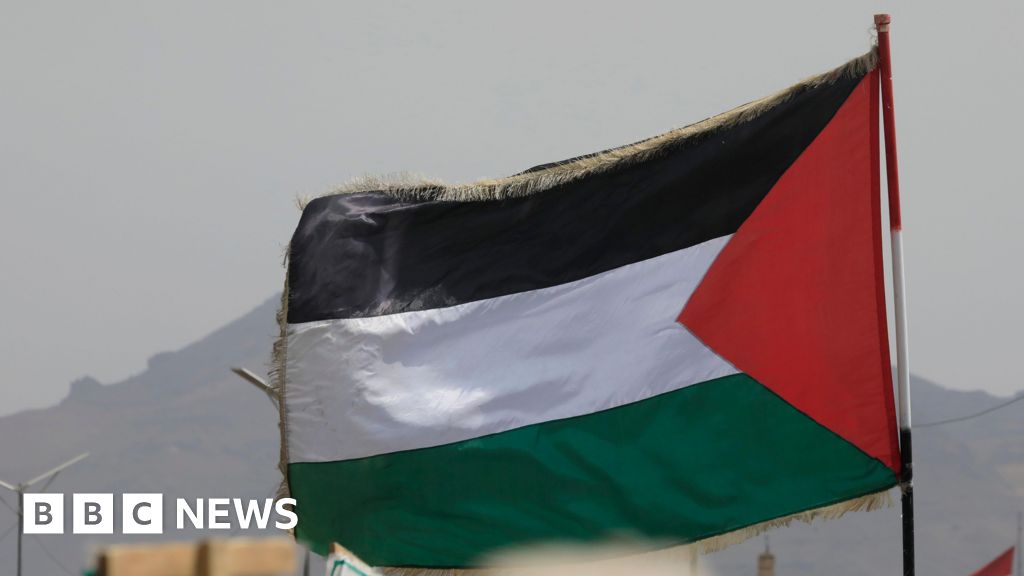BBC diplomatic correspondent
Prime Minister Sir Keir Starmer has announced the UK will recognise a Palestinian state in September unless Israel meets certain conditions, including agreeing to a ceasefire in Gaza and reviving the prospect of a two-state solution.
Israeli Prime Minister Benjamin Netanyahu reacted furiously to the announcement, saying the decision rewarded “Hamas’s monstrous terrorism”.
What would it mean if recognition does go ahead, and what difference would it make?
What does recognising a Palestinian state mean?
Palestine is a state that does and does not exist.
It has a large degree of international recognition, diplomatic missions abroad and teams that compete in sporting competitions, including the Olympics.
But due to the Palestinians’ long-running dispute with Israel, it has no internationally agreed boundaries, no capital and no army. Due to Israel’s military occupation, in the West Bank, the Palestinian authority, set up in the wake of peace agreements in the 1990s, is not in full control of its land or people. Gaza, where Israel is also the occupying power, is in the midst of a devastating war.
Given its status as a kind of quasi-state, recognition is inevitably somewhat symbolic. It will represent a strong moral and political statement but change little on the ground.
But the symbolism is strong. As Foreign Secretary David Lammy pointed out during his speech at the UN on Tuesday, “Britain bears a special burden of responsibility to support the two-state solution”.
 Bettmann via Getty Images
Bettmann via Getty ImagesHe went on to cite the 1917 Balfour Declaration – signed by his predecessor as foreign secretary Arthur Balfour – which first expressed Britain’s support for “the establishment in Palestine of a national home for the Jewish people”.
But that declaration, Lammy said, came with a solemn promise “that nothing shall be done which may prejudice the civil and religious rights of existing non-Jewish communities in Palestine”.
Supporters of Israel have often pointed out that Lord Balfour did not refer explicitly to the Palestinians or say anything about their national rights.
But the territory previously known as Palestine, which Britain ruled through a League of Nations mandate from 1922 to 1948, has long been regarded as unfinished international business.
Israel came into being in 1948, but efforts to create a parallel state of Palestine have foundered, for a multitude of reasons.
As Lammy said, politicians “have become accustomed to uttering the words ‘a two-state solution'”.
The phrase refers to the creation of a Palestinian state, alongside Israel, in the West Bank, including East Jerusalem and the Gaza Strip, broadly along the lines that existed prior to the 1967 Arab-Israeli war.
But international efforts to bring about a two-state solution have come to nothing and Israel’s colonisation of large parts of the West Bank, illegal under international law, has turned the concept into a largely empty slogan.
Who recognises Palestine as a state?
The State of Palestine is currently recognised by 147 of the UN’s 193 member states.
At the UN, it has the status of a “permanent observer state”, allowing participation but no voting rights.
Australia has become the latest country to say it will recognise Palestinian Statehood at the next UN General Assembly in September – after similar announcements from France, Japan, Canada and the UK, on some conditions.
New Zealand said it would consider its position on recognition of a Palestinian state in August, ahead of a formal consideration of the issue in September.
If the UK and France do recognise a Palestinian state next month, Palestine would have the support of four of the UN Security Council’s five permanent members – the other two being China and Russia.
This will leave the US, Israel’s strongest ally by far, in a minority of one.
US Vice-President JD Vance has reiterated the US has no plans to recognise a Palestinian state, citing a lack of functional government.
Washington has recognised the Palestinian Authority, currently headed by Mahmoud Abbas, since the mid-1990s but has stopped short of recognising an actual state.
Several US presidents have expressed their support for the eventual creation of a Palestinian state. But Donald Trump is not one of them. Under his two administrations, US policy has leaned heavily in favour of Israel.
Without the backing of Israel’s closest and most powerful ally, it is impossible to see a peace process leading to an eventual two-state solution.
Why is the UK doing it now?
Successive British governments have talked about recognising a Palestinian state, but only as part of a peace process, ideally in conjunction with other Western allies and “at the moment of maximum impact”.
To do it simply as a gesture, the governments believed, would be a mistake. It might make people feel virtuous, but it would not actually change anything on the ground.
But events have clearly forced the current government’s hand.
The scenes of creeping starvation in Gaza, mounting anger over Israel’s military campaign and a major shift in British public opinion – all of these have influenced government thinking.
The clamour, among MPs and even the cabinet front bench, has become deafening.
At a Commons debate last week, Lammy was bombarded from all sides by questions asking why the UK was still not recognising a Palestinian state.
Health Secretary Wes Streeting summed up the views of many MPs when he urged the government to recognise Palestine “while there is still a state of Palestine left to recognise”.
 Reuters
ReutersBut the UK has not simply followed the lead set by France’s Emmanuel Macron last week or the governments of Ireland, Spain and Norway last year.
Sir Keir has chosen to make his pledge conditional: Britain will act unless the government of Israel takes decisive steps to end the suffering in Gaza, reach a ceasefire, refrain from annexing territory in the West Bank – a move symbolically threatened by Israel’s parliament the Knesset last week – and commit to a peace process that results in a two-state solution.
Downing Street knows there is virtually no chance of Netanyahu committing himself in the next six weeks to that kind of peace process. He has repeatedly ruled out the creation of a Palestinian state.
So British recognition of Palestine is certainly coming.
For all Netanyahu’s implacable opposition, Sir Keir is hoping this is indeed a “moment of maximum impact”.
But the Britain in 2025 is not the Britain of 1917 when the Balfour Declaration was signed. Its ability to bend others to its will is limited. It is hard to know, right now, what the impact will actually be.



